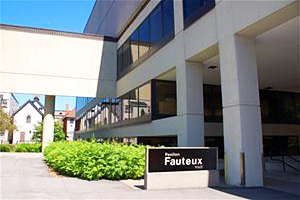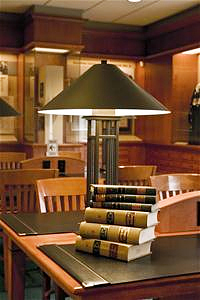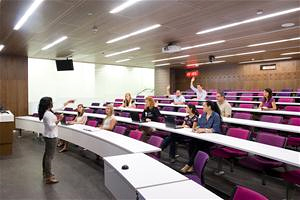University of Ottawa Faculty of Law
The information on this page was provided by the law school.
Official Guide to Canadian JD Programs
Important Information for Applicants to Ontario Law Schools
Introduction
 The University of Ottawa is the oldest and largest bilingual university in Canada. Situated in the nation’s capital, the university is within walking distance of Parliament, the National Library, National Archives, the Supreme Court of Canada, government departments, and cultural centers such as the National Arts Centre and the National Gallery of Canada. The nearby Gatineau Hills offer downhill and cross-country skiing, hiking, and camping, and all of Ottawa skates on the Rideau Canal.
The University of Ottawa is the oldest and largest bilingual university in Canada. Situated in the nation’s capital, the university is within walking distance of Parliament, the National Library, National Archives, the Supreme Court of Canada, government departments, and cultural centers such as the National Arts Centre and the National Gallery of Canada. The nearby Gatineau Hills offer downhill and cross-country skiing, hiking, and camping, and all of Ottawa skates on the Rideau Canal.
The Faculty of Law offers both Common Law and Civil Law degrees, preparing graduates for careers in the country’s two legal systems. The Common Law Section offers a three-year program in both English and French. The Civil Law Section offers a three-year program in French.
The Common Law Section provides a broad academic and professional education for persons interested in the practice of law, government, international service, legal scholarship, conflict resolution, or any other career where the knowledge of legal principles is an advantage. The curriculum develops analytical, research, and practical skills, as well as a disciplined approach to the social and legal problems facing modern society.
The Common Law Section has certain distinctive characteristics. There is a proactive commitment to equity in the hiring practice of staff, in the admission process, and in the curriculum review. There is an emphasis on using a critical approach to legal studies. There is also a commitment to offering the JD degree in both official languages; to developing common law vocabulary, teaching materials, and legal scholarship in French; and to promoting legal services in French in Ontario. In January 2004, the school introduced a new, three-week, intensive January Term. During that period, regularly scheduled classes stop and students are immersed in a full-time, three-week course. Students can choose a course from a complete range of subject matter, methods of instruction, and evaluation. Several of these courses are taught by visiting professors from all over the world.
Enrollment/Student Body
- English Program—2,637 applications in 2017, 320 first-year places
- French Program—185 applications in 2017, 80 first-year places
- School totals—1,180 full time, 38 half time
- 1 percent Indigenous
- 60 percent women
- 10 provinces represented
Faculty
- 76 full time
- 38 women tenure or tenure track
Curriculum
 The Common Law Section offers a three-year JD program in either English or French. Courses in constitutional law, contracts, criminal law and procedure, legal research, legislation, property, torts, civil procedure, and alternative dispute resolution are required. Students must complete a moot court program in their second or third year as well as a major research paper in one of their courses. The balance of the second- and third-year programs are optional courses that can be taken from areas such as feminist studies, Indigenous issues, gay and lesbian issues, constitutional law, criminal and family law, administrative law, international law, electronic commerce, intellectual property law, human rights issues, business, and tax law.
The Common Law Section offers a three-year JD program in either English or French. Courses in constitutional law, contracts, criminal law and procedure, legal research, legislation, property, torts, civil procedure, and alternative dispute resolution are required. Students must complete a moot court program in their second or third year as well as a major research paper in one of their courses. The balance of the second- and third-year programs are optional courses that can be taken from areas such as feminist studies, Indigenous issues, gay and lesbian issues, constitutional law, criminal and family law, administrative law, international law, electronic commerce, intellectual property law, human rights issues, business, and tax law.
Persons seeking both a Common Law and Civil Law degree can apply to complete a fourth year conveying a double degree (LLL/JD). There is also a combined JD/MBA program offered with the Telfer School of Management, a combined JD/MA in international affairs with the Norman Paterson School of International Affairs at Carleton University, and the Canadian and American combined JD program with Michigan State University College of Law and American University Washington College of Law in Washington, DC.
The Programme de droit canadien allows students to earn both degrees (JD and LLL) in three years, thereby opening doors to practice law everywhere in Canada and abroad. This program invites students to take advantage of this innovative and rigorous program to develop critical thinking abilities, creativity, and sensitivity to Canada’s legal, linguistic, and cultural diversity. The Programme de droit canadien is primarily offered in French, but knowledge of English is required.
Our graduate studies programs operate in a Faculty of Law that shares the traditions of both civil law and common law, and in which courses are offered in both official languages. This provides the opportunity for constant intellectual exchange and for comparative studies. The latter have become especially important in this era of globalization.
In addition, the programs are offered in a unique legal environment: Canada’s capital, the centre of a country open to the world and known for its contribution in the area of human rights.
Finally, Ottawa is a major player in the field of information technology. The head offices of many corporations, which are acknowledged leaders in this field, are located in Ottawa.
For these reasons, the Faculty specializes in advanced studies and research in the following areas: international law, human rights, law and technology, environmental law, and comparative law. Legal training in these areas opens the door to a variety of career opportunities in numerous fields (national and international law firms, civil and foreign service, nongovernmental organizations, teaching, etc.).
However, advanced study and research is not confined to these main categories. Where faculty supervision can be arranged, research can also be undertaken in other areas of expertise.
Education Equity
The Education Equity Office focuses on increasing the participation of persons from traditionally underrepresented groups such as visible, linguistic, and ethnic minorities; Indigenous peoples; persons with disabilities; economically disadvantaged persons; and individuals regardless of sexual orientation, gender identity, and gender expression.
The program involves recruiting and outreach; examining the curriculum to ensure that it does not perpetuate racism, sexism, or other discriminatory attitudes or approaches; and ensuring that all students can participate in both academic and social activities. This can be done through the Access Category.
Human Rights Centre
The centre promotes human rights through research and education. A chair in human rights brings leading international scholars, experts, and activists to the centre. The resource library contains the country’s largest bilingual collection of human rights documents.
Library and Physical Facilities
- More than 215,000 volumes
- Library hours: 100 hours/week during the academic year; extended hours during exams
- Access to major Canadian, American, and international electronic resources including LexisNexis/Quicklaw, LN Academic, HeinOnline, Westlaw Canada, and others
- 4 full-time librarians
- 400 seats and offers several group-study rooms to law students
- 83 computers including a new 40-seat computer lab
- Campus-wide free wireless access
The Brian Dickson Law Library is an integral part of the Faculty of Law (formed by two autonomous sections, Common Law and Civil Law), occupying the fourth and fifth floors of Fauteux Hall, and is, as well, one of the main components of the network of University of Ottawa libraries. The Law Library reflects the bijural and bilingual character of the two sections it serves.
The Law Library’s website provides access to a wide range of resources (databases, journals, e-books, reference tools, etc.). Our subject guides offer insight into criminal and civil law, Canadian legislation, and human rights.
Student Activities
A student editorial board, under faculty supervision, publishes the Ottawa Law Review. A moot court component is part of the second year of the program and students may participate in several competitive moots with the support of faculty members. The University of Ottawa Community Legal Clinic offers services to the public. The Common Law Student Society (CLSS) is the umbrella student association. Several other associations such as the Black Law Students Association, Business Law Students Association, Canadian Lawyers Association for International Human Rights, Criminal Law Students Association, Indigenous Law Students Association, Information Technology Law Society, and International Law Students Association also flourish.
Admission
 Applicants must be in their third year of undergraduate studies when applying to law school (three or more years of studies preferred); we strongly encourage students to complete their undergraduate program prior to beginning law school.
Applicants must be in their third year of undergraduate studies when applying to law school (three or more years of studies preferred); we strongly encourage students to complete their undergraduate program prior to beginning law school.
- LSAT required (except for the French program)—no set minimum score; only highest score considered
- Oldest LSAT accepted—June 2014
- A minimum of 3 years of university studies are required
- Rolling admission
- Application deadline—November 1 (March 1 for the French program)
The Common Law Section is interested in creating a vital and diverse academic environment and in preparing competent and compassionate professionals. To ensure that the student body represents the fullest possible range of social, economic, ethnic, and cultural perspectives in our society, we consider many factors. Though academic performance, the personal statement, and LSAT scores are significant factors, consideration can be given to an applicant’s achievements in extracurricular activities and community work, as well as his or her outstanding achievements in previous careers. Unique linguistic or cultural factors in an applicant’s background that add to his or her overall academic achievements, as well as personal challenges such as a physical or learning disability or adverse economic circumstances, are considered.
In addition to the General Category, applicants may apply in one of these categories: Access, Mature, or Indigenous. Additional information is available on our website.
Expenses and Financial Aid
- Full-time tuition and fees (2017)—$18,592.24 (tuition) + $762.73 (incidental fees) = $19,354.97
- Estimated text and casebook fees—$1,200
- Estimated additional expenses—$11,000 to $14,000 (room and board, etc.)
- Scholarships, need-based bursaries, and prizes available
For more information, please visit our website.
